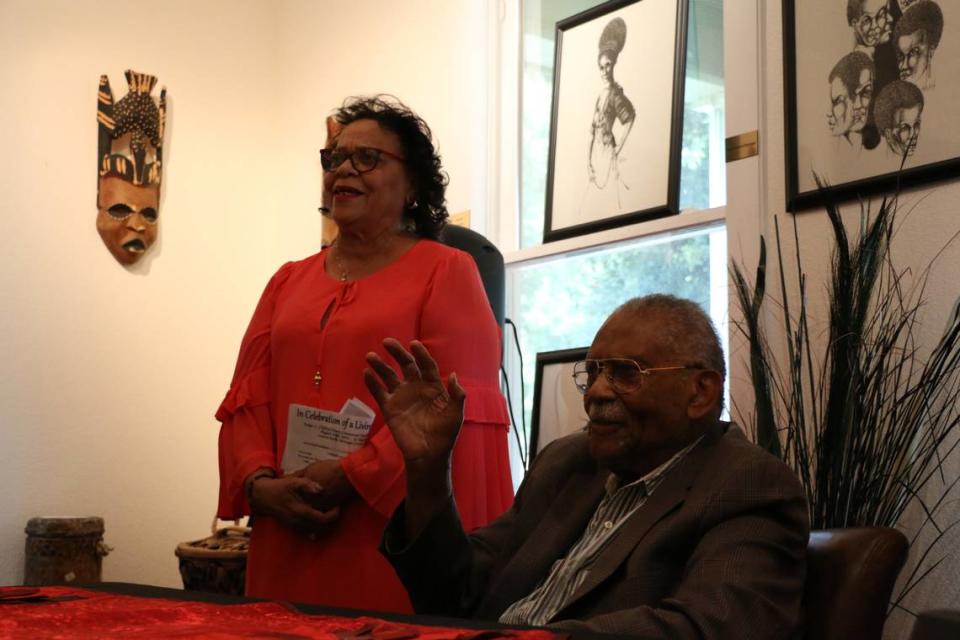Judge L. Clifford Davis was surrounded by a plethora of people, including his mentees, on Saturday afternoon.
A “living legend,” the attendees of his 100th birthday celebration coined him. They filled the Lenora Rolla Heritage Center Museum in southside Fort Worth to honor Davis, one of the first Black district judges to be appointed in Tarrant County.
“I’ve lived ninety nine years, nine months, three weeks, and five days,” said Davis. “So I’m a happy old man.”
It was there at the museum where the community reminisced on his accomplishments and the lasting impact he’s had on civil rights, education, and community representation — on both national and local levels.

“He is the embodiment, I would say, of the lawyer that everyone should seek to be like,” said Fort Worth attorney Bobbie Edmonds.
In addition to his notable judgeship, Davis opened one of the first African-American law offices in Tarrant County.
An Arkansas native, his tenure in law began after he graduated in 1949 from Howard Law School. He joined an Arkansas-based law firm with William Harold Flowers, a leading figure in the civil rights movement in the 1940s.
In 1954, two Dallas lawyers, C.B. Buckley and Louis A. Beckford, joined Davis to establish one of the first Black-run law firms in Tarrant County.
That law firm filed two lawsuits in the ‘50s and the ‘60s, resulting in the desegregation of the Mansfield and Fort Worth school districts. Their law firm assisted attorney Thurgood Marshall of the NAACP on the landmark case that became Brown v. Board of Education (1954).
“Judge Davis has a saying … ‘I open the door, I can let others walk through. It doesn’t have to be me. I will knock down the barriers and then you can walk in to make your lives better’,” said Edmonds.
In his time practicing law, Davis developed a philosophy he vowed to live by. He explained that his philosophy, “civil responsibility,” encouraged him to work for the people.
“We have a civil responsibility, individually and collectively, to treat all inhabitants with dignity, courtesy, respect, and integrity,” without discrimination based on any socioeconomic concept, said Davis. “To practice, advocate for freedom, liberty, justice for the general welfare of the community.”
He said his rejection into the University of Arkansas due to segregation policies inspired him to become a lawyer.
“I opened a gate. I didn’t go in on the playing field, but others did,” said Davis.
His involvement in the civil rights movement in Arkansas helped lead to the integration of students at the University of Arkansas.

He proudly reflects on the impact his career in law has had, particularly the desegregation of schools.
“I loved to see that result,” Davis said. “From working for the general welfare.”
But he said he couldn’t have done it without those who stood by and worked with him.
“I don’t claim I did all this. I said, ‘we did this.’… It was a collective effort,” said Davis.
John White, a mentee of Davis, is one of many attorneys who had the privilege of collaborating and working with the judge. He gave his gratitude to Davis at the celebration.
“The judge [Davis] encouraged me to expand myself with regard to any opportunities that I might have, in addition to representing a black influence,” said White.
White went on to become the second Black assistant district attorney for Tarrant County. He was glad to join Davis in the legal “fight.”
“I learned a lot of compassion with regard to him,” said White.
Davis also worked to correct discrimination in housing, employment, and public facilities in Fort Worth.
Local leaders said they would continue the work that Davis started in the Fort Worth community. Chris Nettles, District 8 city councilman, said the community can help by voting in local elections.
“What I like so much about that is he started this fight, and this fight is still going on,” said Nettles. “On behalf of the mayor and the entire city council, we want to tell you happy birthday, we honor you and we stand on your shoulders.”
“As you celebrate 100 years of life, you have made an impact on the lives of many through the great historical achievements you’ve made for African Americans,” said Congressman Marc Veasey, of Texas Congressional District 33, in a statement to Davis. “Although there is much more work to be done, it is up to us to keep up the momentum.”
The judge’s daughters, Avis and Karen Davis, concluded the celebration, extending their thanks to the community and to their father.
“Dad has a conscience of service, a willingness to give back, extending a hand up to many,” said Karen Davis. “I believe that a community can be made better and there’s value in working hard together.”
Their father’s accomplishments inspired their careers as he mentored them throughout their education. He ignited Avis Davis’ interest in servicing the community and tending to public interest.
“Getting to know some of the work that he was doing on behalf of folks was the way that influenced me and gave me inspiration to develop my career more in the vanguard of public service and public policy,” said Avis Davis.
“I certainly would not have imagined that I would know, have lived with someone who has traversed 100 years from the earliest part of the 20th century into the magnificent 21st century,” she said. “It is so amazing and a blessing to be able to share this centennial year with dear old dad and with all of you.”
EMEA Tribune is not involved in this news article, it is taken from our partners and or from the News Agencies. Copyright and Credit go to the News Agencies, email news@emeatribune.com Follow our WhatsApp verified Channel





